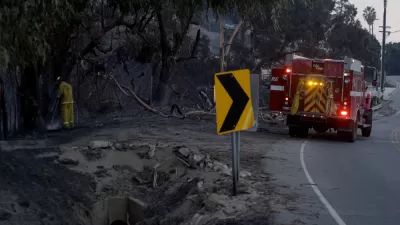An analysis of Airbnb properties across the state shows that despite the high fire risk in many parts of the state, the company and hosts frequently don’t provide adequate warning and evacuation instructions to guests.

“Across California, thousands of short-term Airbnb rentals operate in the state’s most hazardous fire zones, but the company does not provide warnings or evacuation information to guests when they make a reservation, a Los Angeles Times analysis has found.”
According to an article by Ben Poston and Alex Wigglesworth, “More than 23,000 California Airbnb listings were in wildfire-prone areas in January, accounting for about 20% of the company’s short-term rentals in the state, The Times’ analysis shows.” Yet “The Airbnb website doesn’t routinely alert customers when properties are in a wildfire hazard zone. Many rental hosts ban smoking, fireworks, charcoal grills or campfires but don’t specifically mention wildfire risks.” Moreover, “Some customers say the company’s policies actually incentivize people to travel to areas near active wildfires, potentially clogging evacuation routes and burdening emergency responders.”
Some cities are taking action to implement stricter regulations for short-term rental hosts. In Malibu, “Hosts are now required to post a code of conduct in rental units telling guests the city is located entirely within the highest fire hazard area. It also tells renters which evacuation zone the property is in, and lists a city website that provides evacuation information.” In Truckee, “Short-term rental operators must post an evacuation map on-site, as well as a flier that notifies guests they’re staying in a high-risk area for fire and tells them how to sign up for emergency alerts,” and rental properties face mandatory inspections every three years.
FULL STORY: In California’s high-risk fire country, Airbnb offers guests no warning or escape plan

Planetizen Federal Action Tracker
A weekly monitor of how Trump’s orders and actions are impacting planners and planning in America.

Restaurant Patios Were a Pandemic Win — Why Were They so Hard to Keep?
Social distancing requirements and changes in travel patterns prompted cities to pilot new uses for street and sidewalk space. Then it got complicated.

Map: Where Senate Republicans Want to Sell Your Public Lands
For public land advocates, the Senate Republicans’ proposal to sell millions of acres of public land in the West is “the biggest fight of their careers.”

Maui's Vacation Rental Debate Turns Ugly
Verbal attacks, misinformation campaigns and fistfights plague a high-stakes debate to convert thousands of vacation rentals into long-term housing.

San Francisco Suspends Traffic Calming Amidst Record Deaths
Citing “a challenging fiscal landscape,” the city will cease the program on the heels of 42 traffic deaths, including 24 pedestrians.

California Homeless Arrests, Citations Spike After Ruling
An investigation reveals that anti-homeless actions increased up to 500% after Grants Pass v. Johnson — even in cities claiming no policy change.
Urban Design for Planners 1: Software Tools
This six-course series explores essential urban design concepts using open source software and equips planners with the tools they need to participate fully in the urban design process.
Planning for Universal Design
Learn the tools for implementing Universal Design in planning regulations.
Heyer Gruel & Associates PA
JM Goldson LLC
Custer County Colorado
City of Camden Redevelopment Agency
City of Astoria
Transportation Research & Education Center (TREC) at Portland State University
Camden Redevelopment Agency
City of Claremont
Municipality of Princeton (NJ)




























